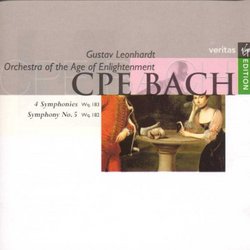| All Artists: C.P.E. Bach, Leonhardt, Oae Title: C.P.E. Bach: Four Symphonies, Wq.183 / Symphony No. 5 in B minor - Orchestra of the Age of Enlightenment / Gustav Leonhardt Members Wishing: 0 Total Copies: 0 Label: EMI Classics Imports Release Date: 3/14/1995 Genre: Classical Styles: Historical Periods, Classical (c.1770-1830), Symphonies Number of Discs: 1 SwapaCD Credits: 1 UPC: 724356118225 |
Search - C.P.E. Bach, Leonhardt, Oae :: C.P.E. Bach: Four Symphonies, Wq.183 / Symphony No. 5 in B minor - Orchestra of the Age of Enlightenment / Gustav Leonhardt
 | C.P.E. Bach, Leonhardt, Oae C.P.E. Bach: Four Symphonies, Wq.183 / Symphony No. 5 in B minor - Orchestra of the Age of Enlightenment / Gustav Leonhardt Genre: Classical
|
Larger Image |
CD Details |
CD ReviewsDeliciously raucous Leslie Richford | Selsingen, Lower Saxony | 08/09/2004 (5 out of 5 stars) "It is a well-known adage that if you lived in the eighteenth century and said "Bach", you meant not Johann Sebastian but his second son Carl Philipp Emanuel (1714 - 1788), whose long career at the royal Prussian court in Berlin and then as successor to Telemann in Hamburg, but also, of course, his not inconsiderable musical productivity destined him to be one of the most famous musicians of his age. Today, his life and work stand very much in the shadow of his father, but the period instrument revival of the last 40 years has begun to restore him to favour, at least in the eyes of those who have time for music before Mozart.
Emanuel Bach wrote 19 symphonies: nine of them while he was still in Berlin, the other ten in Hamburg. The Berlin symphonies seem to have been scored for strings only, but had wind parts added later. The first set of Hamburg symphonies, Wq. 182,1-6, were written at the behest of Baron van Swieten (well-known to readers of Mozart biographies) and are for strings only. The last four symphonies, Wq. 183, are in twelve parts for an orchestra of about 40 musicians including horns, oboes, flutes and bassoons. It seems that none of these works was written to satisfy popular taste or demand, and Emanuel Bach, whose effective life as a composer spans the periods known to students of German literature as "Empfindsamkeit" (sensibility) and "Sturm und Drang" (usually infelicitously translated as "storm and stress"), took the opportunity of creating short, but brilliant pieces full of originality and individualism - so full, in fact, that even contemporaries complained that he had sacrificed comprehensibility to originality. Repeated notes, leaps, sudden breaks, rapid changes of tempo, sudden horn blasts ... the list could go on. In a conversation with the poet Matthias Claudius, Emanuel Bach once criticized the music of his half-brother Johann Christian as having "nothing behind it" and added, "Music has higher intentions; it is not intended [merely] to fill the ear, but [rather] to set the heart in motion" (my translation from the German original). Although these symphonies are seldom heard and rarely recorded, they have found some excellent advocates. Five of the nine early "sinfonias" are to be found on a wonderful CD by "Les Amis de Philippe", directed by Ludger Rémy, on the German specialist label cpo. Some deliciously raucous horn playing and excellent acoustics make for real listening pleasure, and Ludger Rémy's liner notes are superb. The six string symphonies were recorded in 1977 or 1978 by the Academy of Ancient Music on L'Oiseau-Lyre and were recently re-released at budget price, a magnificent gift to the public with some glorious string playing and engineering that surpasses almost anything I have heard despite the analogue technology. The only drop of wormwood is the fact that the CD has no liner notes whatsoever. Perhaps Emanuel Bach's greatest symphonic achievement was his Wq. 183, granted a more than excellent performance by the Orchestra of the Age of Enlightenment directed by harpsichordist Gustav Leonhardt on Virgin Veritas. The sound here is a little softer and milder than on the other two CDs, but the playing and musicianship is exquisite. I have absolutely no complaints about any of these three CDs, and if I were only able to own one of them, I would be very hard put to make a choice. Fortunately, I don't have to, instead I can enjoy all three. I doubt whether I will ever tire of listening to them." |

 Track Listings (15) - Disc #1
Track Listings (15) - Disc #1